Related Research Articles
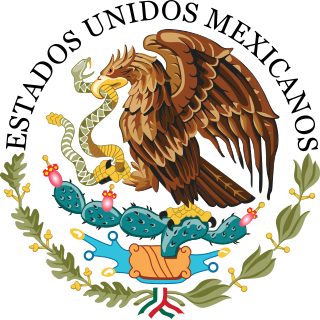
The politics of Mexico function within a framework of a federal presidential representative democratic republic whose government is based on a multi-party congressional system, where the President of Mexico is both head of state and head of government. The federal government represents the United Mexican States and is divided into three branches: executive, legislative and judicial, as established by the Political Constitution of the United Mexican States, published in 1917. The constituent states of the federation must also have a republican form of government based on a congressional system as established by their respective constitutions.
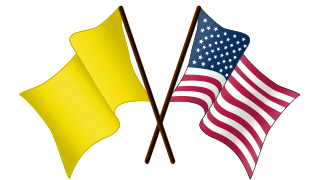
The Libertarian Party (LP) is a political party in the United States that promotes civil liberties, non-interventionism, laissez-faire capitalism, and limiting the size and scope of government. The party was conceived in August 1971 at meetings in the home of David F. Nolan in Westminster, Colorado, and was officially formed on December 11, 1971, in Colorado Springs. The organizers of the party drew inspiration from the works and ideas of the prominent Austrian school economist Murray Rothbard. The founding of the party was prompted in part due to concerns about the Nixon administration, the Vietnam War, conscription, and the introduction of fiat money.
The Whig Party was a mid-19th century political party in the United States. Alongside the Democratic Party, it was one of two major parties between the late 1830s and the early 1850s and part of the Second Party System. As well as four Whig presidents, other prominent members included Henry Clay, Daniel Webster, Rufus Choate, William Seward, John J. Crittenden, and John Quincy Adams. The Whig base of support was amongst entrepreneurs, professionals, Protestants, and the urban middle class. It had much less backing from poor farmers and unskilled workers.

The Institutional Revolutionary Party is a political party in Mexico that was founded in 1929 and held uninterrupted power in the country for 71 years, from 1929 to 2000, first as the National Revolutionary Party, then as the Party of the Mexican Revolution and finally as the PRI beginning in 1946.
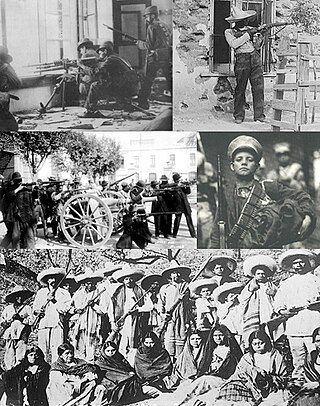
The Mexican Revolution was an extended sequence of armed regional conflicts in Mexico from 20 November 1910 to 1 December 1920. It has been called "the defining event of modern Mexican history" and resulted in the destruction of the Federal Army, its replacement by a revolutionary army, and the transformation of Mexican culture and government. The northern Constitutionalist faction prevailed on the battlefield and drafted the present-day Constitution of Mexico, which aimed to create a strong central government. Revolutionary generals held power from 1920 to 1940. The revolutionary conflict was primarily a civil war, but foreign powers, having important economic and strategic interests in Mexico, figured in the outcome of Mexico's power struggles; the U.S. involvement was particularly high. The conflict led to the deaths of around one million people, mostly noncombatants.
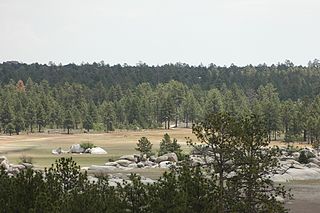
Baja California, officially Estado Libre y Soberano de Baja California, is a state in Mexico. It is the northernmost and westernmost of the 32 federal entities of Mexico. Before becoming a state in 1952, the area was known as the North Territory of Baja California. It has an area of 70,113 km2 (27,071 sq mi) and comprises the northern half of the Baja California peninsula, north of the 28th parallel, plus oceanic Guadalupe Island. The mainland portion of the state is bordered on the west by the Pacific Ocean; on the east by Sonora, the U.S. state of Arizona, and the Gulf of California; on the north by the U.S. state of California; and on the south by Baja California Sur.

The Party of the Democratic Revolution is a state-level social democratic political party in Mexico. The PRD originated from the Democratic Current, a political faction formed in 1986 from the Institutional Revolutionary Party (PRI). The PRD was formed after the contested general election in 1988, which the PRD's immediate predecessor, the National Democratic Front, believed was rigged by the PRI. This sparked a movement away from the PRI's authoritarian rule.

The Ecologist Green Party of Mexico is a green political party in Mexico. Founded in 1986, the party is associated with Jorge González Torres and his son Jorge Emilio González Martínez. It has seldom gotten more than 10% of the vote nationwide, but in the 21st century has joined alliances with different major parties.

Andrés Manuel López Obrador, also known by his initials AMLO, is a Mexican politician who is the 65th and current president of Mexico since 2018. He previously served as Head of Government of Mexico City from 2000 to 2005.

Elections in Mexico are held every 6 years to elect a president and every 3 years to elect a legislature. These elections determine who, on the national level, takes the position of the head of state – the president – as well as the legislature.

Citizens' Movement is a Mexican centre-left political party. The party was founded in 1999, under the name Convergence for Democracy, which was then shortened to Convergence in 2002 and changed to Citizens' Movement in 2011.

Mexico, officially the United Mexican States, is a country in the southern portion of North America. Covering 1,972,550 km2, it is the world's 13th largest country by area; with a population of almost 130 million, it is the 10th most populous country and has the most Spanish speakers in the world. Mexico is organized as a federal constitutional republic comprising 31 states and Mexico City, its capital and largest city, which is among the world's most populous metropolitan areas. The country shares land borders with the United States to the north, with Guatemala and Belize to the southeast; as well as maritime borders with the Pacific Ocean to the west, the Caribbean Sea to the southeast, and the Gulf of Mexico to the east.

The Democratic Party of New Mexico (DPNM) is the affiliate of the Democratic Party in the U.S. state of New Mexico. It is headquartered in Albuquerque and led by Chair Jessica Velasquez, Vice Chair Manny Crespin, Secretary Isaac Dakota Casados, and Treasurer Rayellen Smith.

The Republican Party of New Mexico is the affiliate of the United States Republican Party in New Mexico. It is headquartered in Albuquerque and led by chairperson Steve Pearce, vice chair Amy Barela, secretary Kathleen Apodaca, and treasurer Kim Skaggs. It currently has weak electoral power in the state, holding no statewide or federally elected offices, and having minorities in both houses of the New Mexico legislature.

The president of Mexico, officially the president of the United Mexican States, is the head of state and head of government of Mexico. Under the Constitution of Mexico, the president heads the executive branch of the federal government and is the commander in chief of the Mexican Armed Forces. The current president is Andrés Manuel López Obrador. The current president-elect is Claudia Sheinbaum, who will take office on October 1, 2024.

The Federal Government of Mexico is the national government of the United Mexican States, the central government established by its constitution to share sovereignty over the republic with the governments of the 31 individual Mexican states, and to represent such governments before international bodies such as the United Nations. The Mexican federal government has three branches: executive, legislative, and judicial and functions per the Constitution of the United Mexican States, as enacted in 1917, and as amended. The executive power is exercised by the executive branch, which is headed by the president and her Cabinet, which, together, are independent of the legislature. Legislative power is vested upon the Congress of the Union, a bicameral legislature comprising the Senate and the Chamber of Deputies. Judicial power is exercised by the judiciary, consisting of the Supreme Court of Justice of the Nation, the Council of the Federal Judiciary, and the collegiate, unitary, and district courts.
The National Regeneration Movement, commonly referred to by its syllabic abbreviation Morena, is a major left-wing populist political party in Mexico. As of 2023, it is the largest political party in Mexico by number of members; it has been the ruling party since 2018, and won a second term in the 2024 general election.
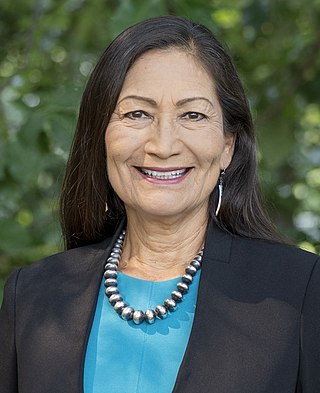
Debra Anne Haaland is a Native American politician serving as the 54th United States Secretary of the Interior. A member of the Democratic Party, she previously served as the U.S. representative for New Mexico's 1st congressional district from 2019 to 2021 and as chair of the New Mexico Democratic Party from 2015 to 2017. Haaland, a Native American, is an enrolled member of the Laguna Pueblo tribe.
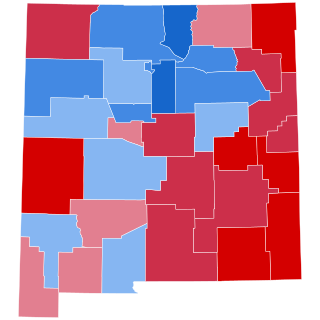
The 2020 United States presidential election in New Mexico was held on Tuesday, November 3, 2020, as part of the 2020 United States presidential election in which all 50 states plus the District of Columbia participated. New Mexico voters chose electors to represent them in the Electoral College via a popular vote, pitting the Republican Party's nominee, incumbent President Donald Trump, and running mate Vice President Mike Pence against Democratic Party nominee, former Vice President Joe Biden, and his running mate California Senator Kamala Harris. New Mexico has five electoral votes in the Electoral College.
References
- ↑ "Perfil del legislador". Legislative Information System. Retrieved 10 February 2015.